Luminary Founder Cate Luzio on Quitting Her Banking Job to Help Women Advance Their Careers
January 04, 2019 | Filed in: Woman of the Week
Make no mistake: Before Cate Luzio quit her big banking job, she had it made. She led a global business at HSBC and jetted around the world for meetings every month. She managed huge teams and her career was soaring. Still, she felt like something was missing, so she took some time off. Three months later, she had a business plan for Luminary, a “collaboration hub” and co-working space for women that opened its doors in New York City in November. Offering individual and corporate memberships, Luminary’s multi-level, 15,000-square-foot flagship includes conference rooms, meeting spots, comfortable chairs, tons of desk space, a fitness studio, café, locker room, and pretty much anything else you’d need to run the world. Here, Cate talks about her vision for Luminary, her banking career, and why she wants to help more women rise to the C-suite.
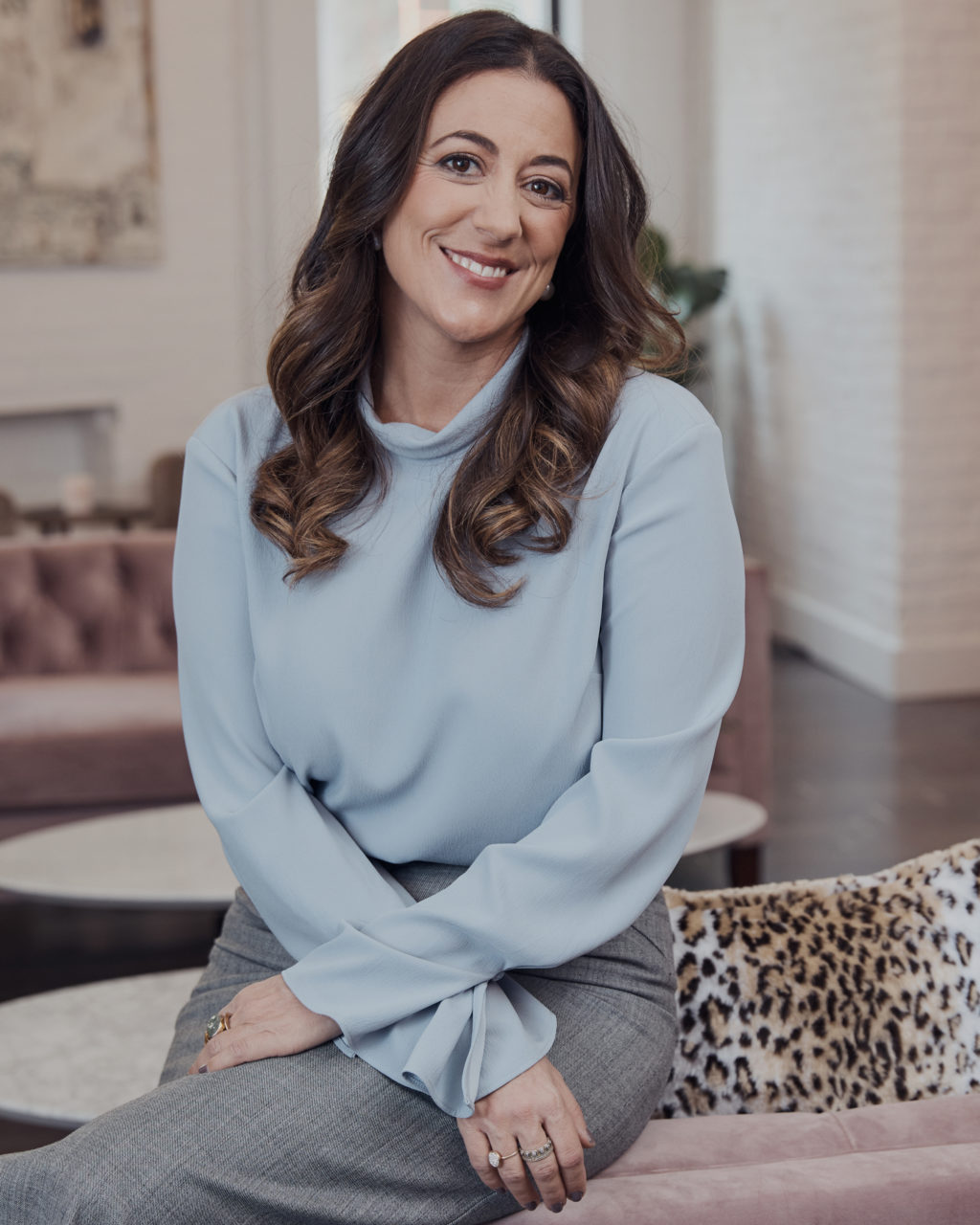
Cate wears the Sabrina top, the Surrey skirt, and the Capri earrings.
I NEVER EXPECTED I WOULD WORK IN FINANCE. I got there kind of randomly. When I was growing up, my father worked at the FBI and my mom was a teacher. I wanted to follow in my father’s footsteps and go into public service, so I studied political science and did internships in government. Of course, I thought I had my whole life figured out. But I really didn’t. That’s one thing I always tell younger women: You don’t need to have a big plan.
WHEN I GRADUATED FROM COLLEGE, I got a job at a nonprofit in Washington, D.C. After I’d been working there for a year, the CFO asked to see me. He said, “Cate, you need to leave.” I said, “I’m not doing a good job?” And he said, “No. You’re too energetic and such a go-getter that you’re going to feel stuck here, I’d hate to see that happen.” So I started looking for another job. It was during the first tech boom and I was recruited by a start-up in Virginia. I was barely literate on the internet, but they hired me to do business development, which I also knew nothing about. Eight months later, they sent me to China to set up ventures with Chinese companies. I didn’t speak Chinese and had barely traveled internationally, but the company took a chance on me. The executives said, “Go try this. We think you can do it.”
AFTER A FEW YEARS WORKING IN CHINA, I returned to the U.S. and got my master’s degree in international relations from Georgetown. Then I was recruited by a bank to do international development. Again, I knew nothing about the banking industry, and had to be convinced to take the job. That’s how I started my 17-year career in finance.
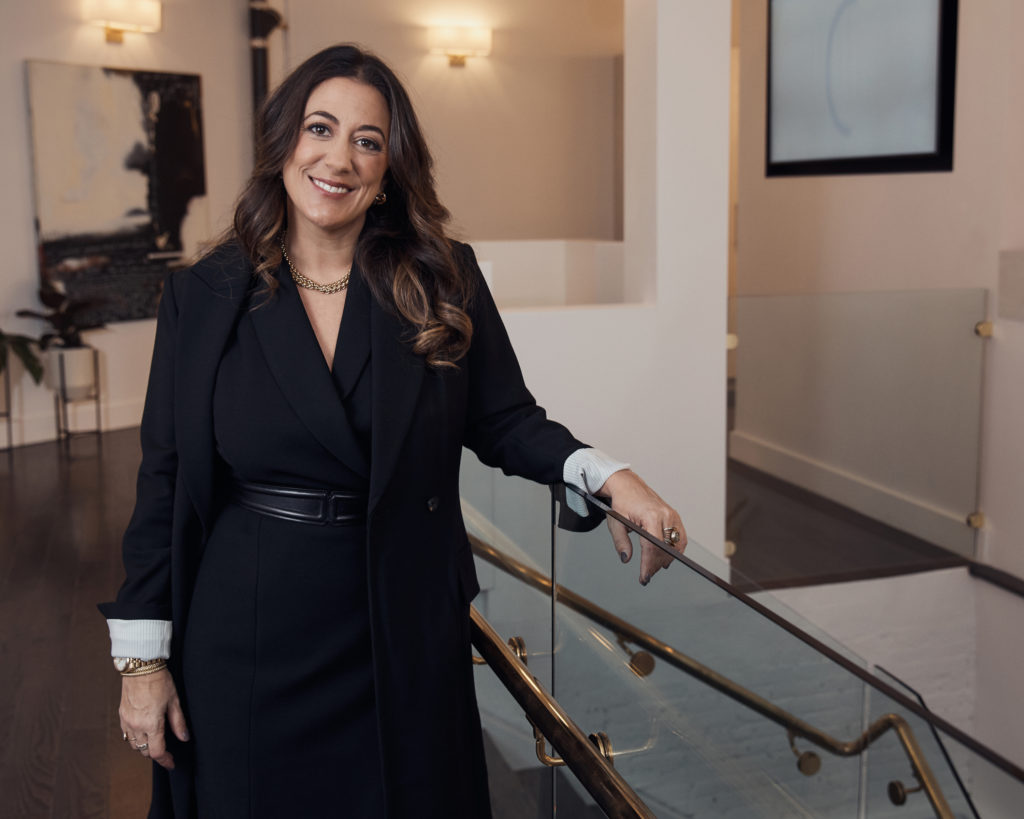
Cate wears the Dana dress, the Cheryl jacket, the Valentina necklace, and the Notched belt.
I WAS TAPPED FOR ALMOST EVERY JOB I’VE EVER HAD. I had to be talked into almost all of them, too. The person on the other side of the table would tell me why I was qualified and a good fit. I was fortunate, because that doesn’t happen to a lot of women. This issue with self-confidence that women often have, I definitely had, too. (I still do.) But I also had a strong drive to prove myself.
I GREW UP IN NEW JERSEY, AS THE MIDDLE CHILD BETWEEN TWO BROTHERS who were a lot bigger than me. We were all extremely athletic, and I needed to push my way into things if I was going to play with them. My father always said, “Work hard and then work harder. Then make yourself visible, because you should be.” He taught me that it’s not enough to put your head down and be a taskmaster: Get things done, and then raise your hand. As a result, I was very outspoken throughout my career. I wanted to be a leader, and I made it clear to my managers that I wanted to progress.
MY LIFE MOTTO IS “WALK IT OFF.” I had to learn that the hard way. The first time I came home crying because I got pushed down playing stickball, my dad said, “Brush yourself off. Unless you’re bleeding—or even if you are—you get back out there.” And that’s been my attitude ever since. No one bats 1,000. You make mistakes and have rough days. They make you tougher.
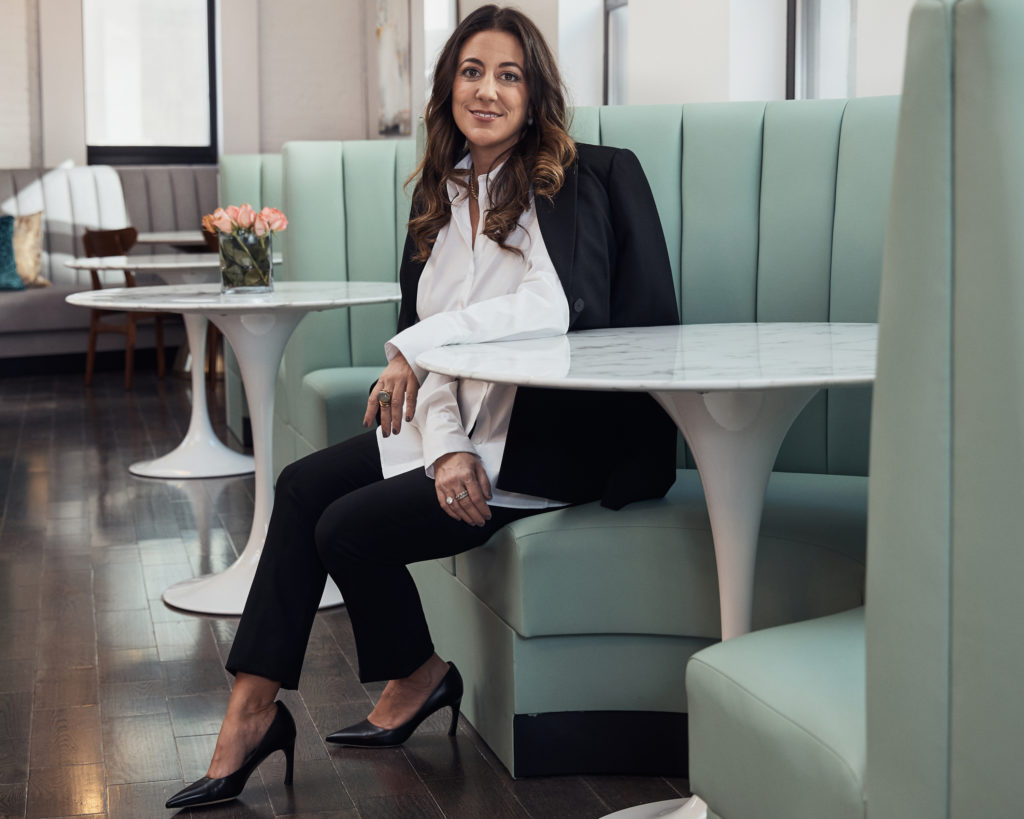
Cate wears the Lila shirt, the Collins blazer, the Foster pant, and the Ginger pumps.
THERE ARE A LOT OF POLITICS IN FINANCE. At one of my former jobs, I was the global head of a business, and then my boss left and a new guy came in. I was doing a good job, but he decided to bring in a different guy he’d worked with previously and make him my co-head. I sucked it up and said, “I’m going to let my performance speak for itself.” Within a year, my co-head got a big promotion with a press release, even though I’d been managing a much larger part of the business. I got nothing. I knew it wasn’t personal, but it sent a message that a woman could prove herself time and time again, and run the fastest-growing business at the bank, and she still wasn’t going to get recognized for it. My coach at the time said to me, “Cate, it’s lonely at the top, but it’s even lonelier when you’re a woman.” I had never understood this until that moment.
UNFORTUNATELY, I DIDN’T HAVE MANY FEMALE MENTORS in banking. That’s one of the reasons why I started Luminary. We need more women supporting women.
I WILL ALWAYS REMEMBER ONE SENIOR WOMAN who looked out for me. She was my boss’s boss’s boss at JPMorgan Chase & Co. My job was in London and hers was in New York, but when I started, she said, “Cate, listen, we’re a tough organization. If and when you ever need me, you call.” That was great. I felt like someone cared about me. A few years later, a man who had worked with her joined my office and scheduled a one-on-one meeting with me. He was several levels ahead of me, and I didn’t know why he wanted to see me, so I was nervous. I walked in and he said, “So, you’re Cate Luzio?” I said, “Yes.” And he said, “Well, another senior executive told me you’re a superstar and I had to take care of you.” That man is now my mentor. Even though I never worked for that senior woman directly, the connection felt personal. She wanted me to succeed, and that meant a lot.
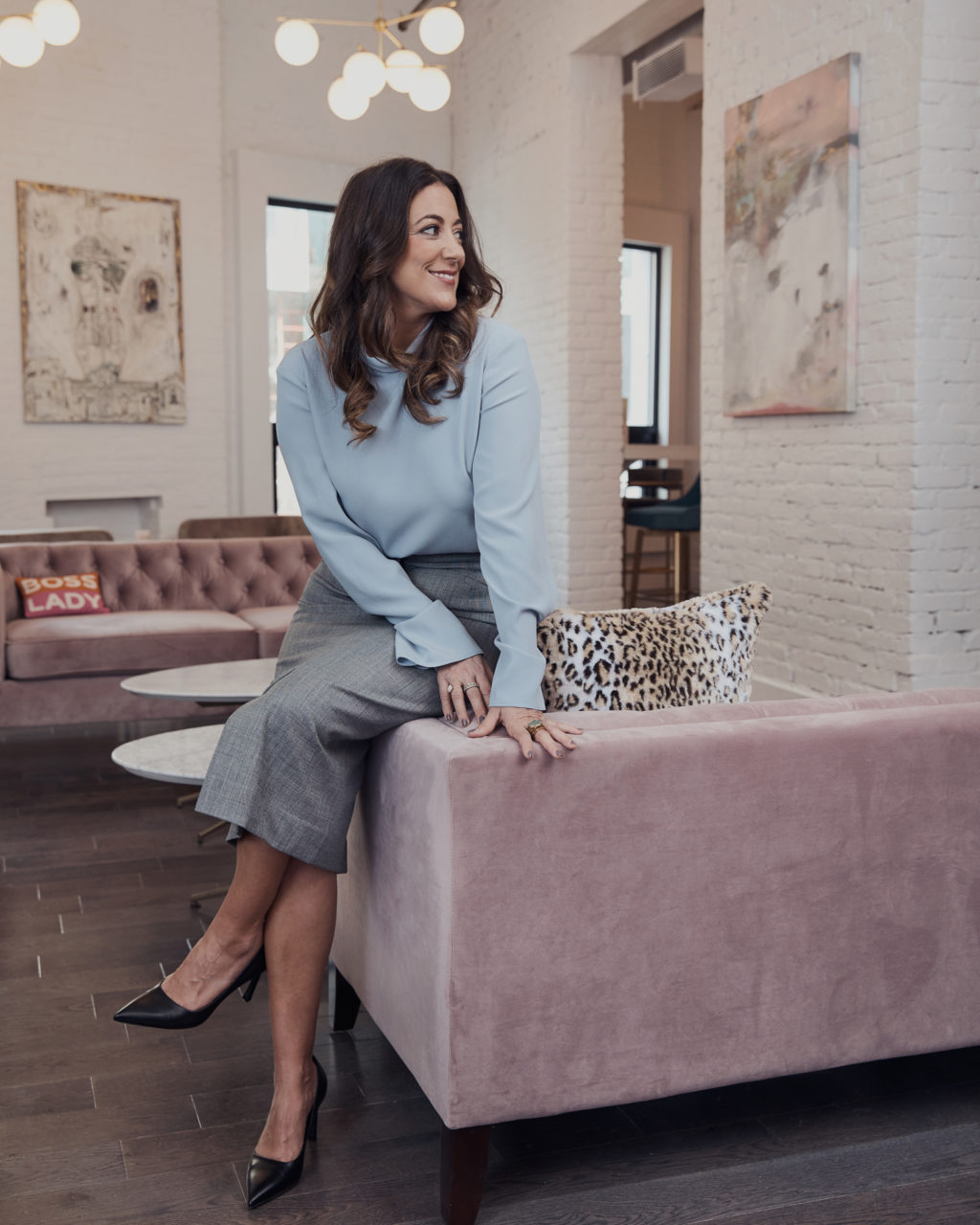
Cate wears the Sabrina top, the Surrey skirt, the Capri earrings, and the Ginger pumps.
I FIND IT EXHILARATING TO LEARN about new cultures and perspectives. I love to meet people and ask them about themselves, which has taken me far in my career. I’ve spent a lot of time in international banking, and you can’t go into a new community as if you know it all. I spent years on the road for two to three weeks every month, because I wanted to meet my teams and my clients face-to-face. I think it shows respect.
I LEFT HSBC IN LATE 2017 because I got offered a job by another bank, but I realized then that I wanted to step back. In banking, you get addicted to the money and the power. I had gone through a divorce, and I was asking myself, “What am I passionate about?” My mentor said, “Go take some time. You can always come back to banking. But you have a larger purpose. Go see what it is.” So last January, I made the decision to get out. I kept getting calls from recruiters saying, “Wait, you’re a free agent? I have a million banks that will love you.” It was hard to say no. But I was tired of all that horse trading. I saw that a lot of these companies were poaching women at the senior level rather than developing the more junior ones. I have a really hard time with that.
WE KEEP TALKING ABOUT NEEDING MORE WOMEN on boards and in the C-suite, but if we just keep moving women around at the top, those numbers are never going to change. Meanwhile, the younger, more junior women in the pipeline will leave because they’re not getting the support they need. Look at the statistics: There’s a ton of junior women, over 50 percent of the workforce in most industries. But by the time they get to the middle of their career, where do they go? It’s those women in the middle that I want to focus on.
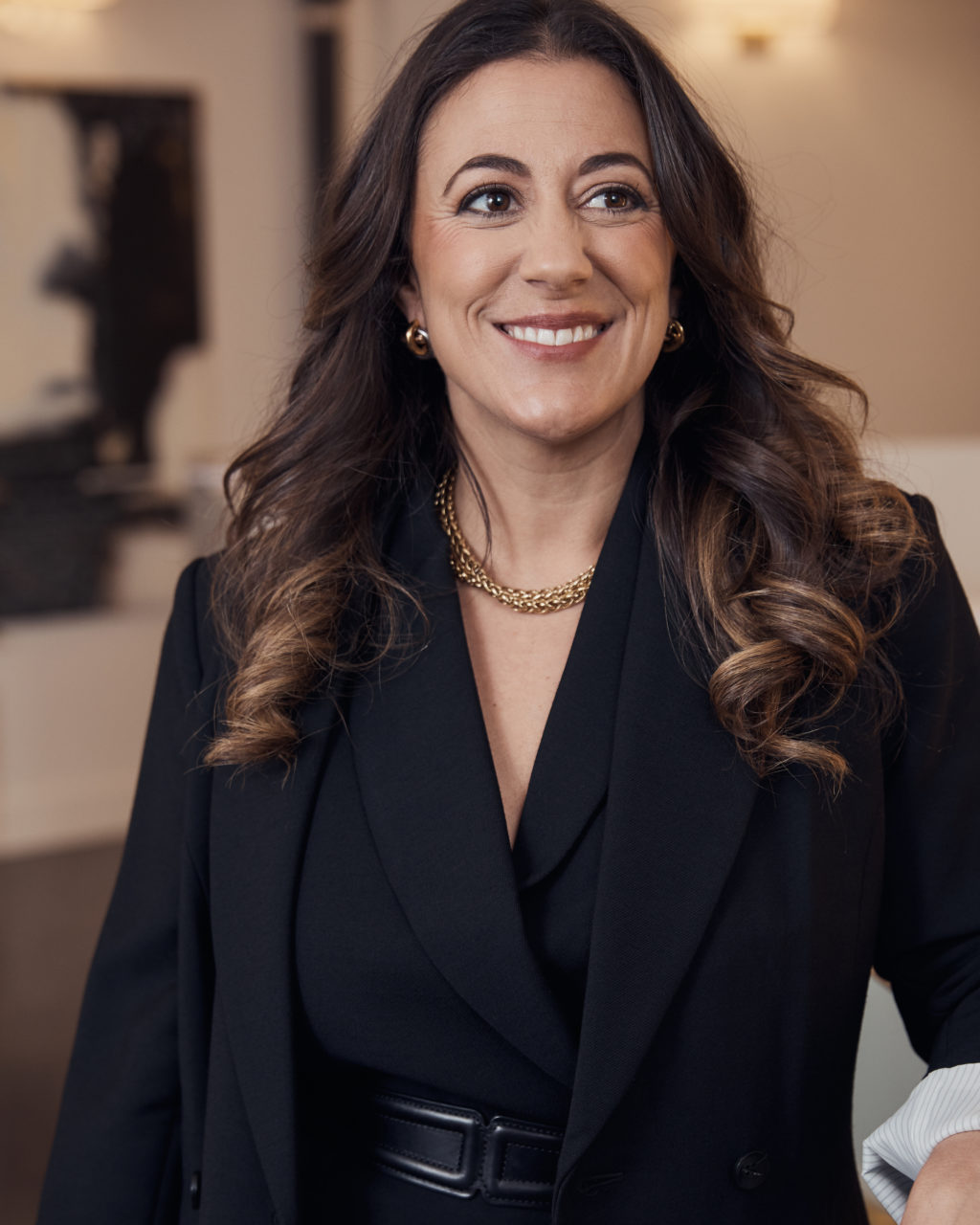
Cate wears the Dana dress, the Cheryl jacket, the Valentina necklace, and the Notched belt.
I GOT THE IDEA FOR LUMINARY IN FEBRUARY 2018, a few months after I quit my job. I’d been invited to a small fundraiser, and I was so amazed by the backgrounds of all the women in that room. There were only about 20 of them, mostly older than me, and they’d all had great careers. And they all said to me, “How can I help you?” I rode home on the subway afterwards, reflecting on all these women who wanted to support each other and were willing to make connections on my behalf. I thought, “How can we do that on a larger scale?” I’d had a million one-on-one coffees with women throughout my career, and I wanted to know how we could turn those one-on-one conversations into three-on-threes and five-on-fives, and then into something much bigger.
I GOT HOME AFTER THAT DINNER AND STARTED WRITING DOWN IDEAS. About a week later, without getting out of my pajamas, I had a business plan for Luminary. I started booking trips around the U.S. to visit other women’s spaces, doing micro-focus groups with women, asking questions about their careers, what they were doing, and what they were missing.
LUMINARY IS FOR WOMEN WHO ARE ASKING THEMSELVES, “How do I continue to invest in myself rather than waiting around for my company to do it?” I’ve said this to anyone who ever came into my office looking for advice: “Nobody cares about your career more than you do. Invest in yourself in lots of different ways.”
MY MOM WAS VERY NERVOUS ABOUT MY STARTING LUMINARY. She probably still is. So am I. I don’t have a safety net. I’ve put my life savings into this business. I chose to self-fund because I wanted to stick to the vision that I had, and quickly pivot if we want to do new things. If I’m asking women to commit time and money to joining Luminary, I want to show them that I’m just as committed, and putting my money where my mouth is.
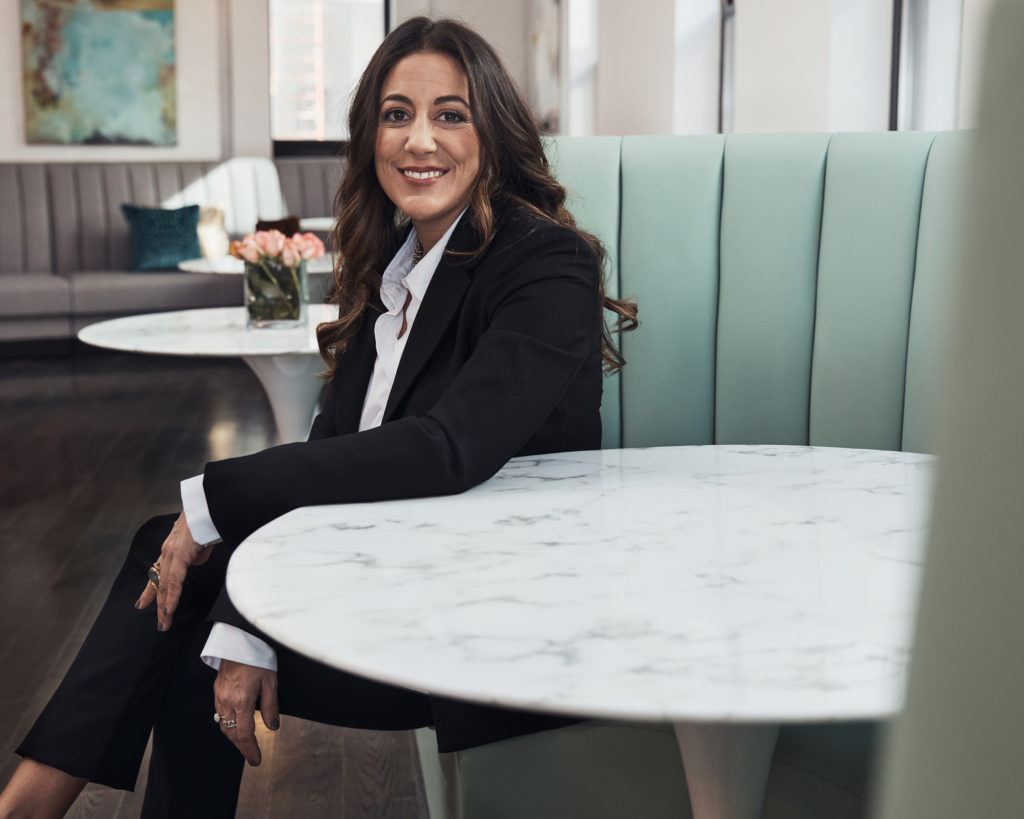
Cate wears the Lila shirt, the Collins blazer, and the Foster pant.
I’M NOT A BIG RELAXER. I think it’s hereditary—my father isn’t either. Exploring a new country or new city is probably my biggest outlet. I’ll dive into a place and totally focus on where I am in the present. When I was traveling all the time, people were always saying, “Oh my gosh, you’re getting back on a plane?” And I’d say, “Yeah, but I’m going to Mongolia!” Or, “I’m going to Sri Lanka. How cool is that?” I also get a lot of energy from people. I love spending time with my family. I don’t have kids, but I have nine amazing nieces and nephews.
I’M A VERY STRUCTURED PERSON. At an early age, I learned from Jamie Dimon at JP Morgan to keep a daily “to do” list and cross things off. I also don’t go to bed without reading, forwarding or delegating every single email in my inbox. I get up at 5:30 A.M., plan out my time, and jam my schedule with meetings. I’m an executor, no matter where I work, and I like to squeeze a lot out of every day.
Photographs by Jeff Allen at Luminary. Styling by Sam Michel.





